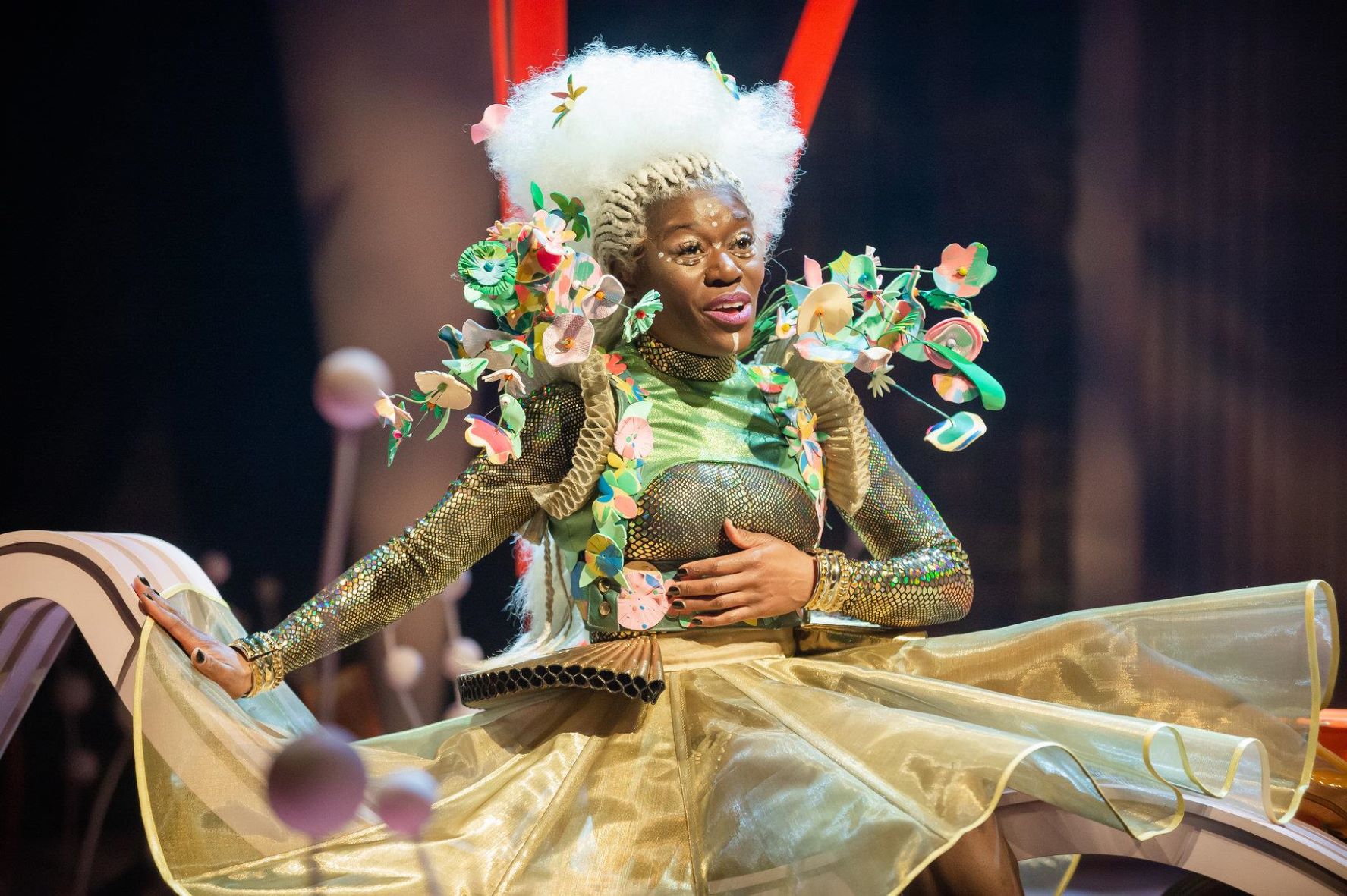
Culture Writer Zenna Hussain reviews Much Ado About Nothing at the RSC, praising the Afro-futuristic setting and ‘electric chemistry’ between the main protagonists
From the entrance of Don Pedra (a gender-swapped version of Don Pedro played by Ann Ogbomo), Benedick (Luke Wilson) and Claudio (Mohammed Mansaray), descending from the sky on ropes, I could tell this adaption of Much Ado about Nothing was going to entertain. Given this and the fact that most adaptions seem to be fairly straight-cut, the idea of an Afro-futuristic version of my favourite play, in the iconic Royal Shakespeare Company in the birthplace of Shakespeare meant I had no idea what to expect, but expectations were high. And they were met.
“An Afro-futuristic version of my favourite play […] expectations were high. And they were met.
Shakespeare’s Much Ado About Nothing is perhaps one of his less valued plays, due to its romantic comedy plot, the witty exchange of barbs and physical humour as both Benedick and Beatrice are ‘too wise to woo peaceably.’ The adaption’s effectiveness relies heavily on decent romantic chemistry between leads and the natural charisma of the actors.
The plot goes: Don Pedra returns from war, with soldiers Benedick and Claudio visiting Leonato (Kevin N Golding), father of Hero (Taya Ming) and uncle to Beatrice (Akiya Henry). Claudio and Hero quickly fall in love and arrange to marry, while Benedick and Beatrice swear they never will. The others then conspire to trick them into falling into love. In the background, however, a more malicious plot emerges; Don Pedra’s brother plots to make Claudio believe Hero has been unfaithful to him.
“Akiya Henry (playing Beatrice) is the shining star of the production, with her quick wit, audacious behaviour, and truly incredible costumes
Akiya Henry is the shining star of the production, with her quick wit, audacious behaviour, and truly incredible costumes, as well as her chemistry with both Benedick and Don Pedra, as the play is set in a futuristic world where gender preference does not seem to matter.
One of the beauties of art is how every person can have a different interpretation of the same play, and with Shakespeare especially, the idea of a fully white cast grappling with issues no longer relevant can be off-putting. Yet, this rom-com play managed to handle the themes of slut-shaming, fear of being loved and the idea of familial, amorous, and platonic love. This 400-year-old play is not only modern, it is futuristic.
The intergalactic nature of it was perhaps a little unnecessary but it did mean it could exist undated, while claiming different parts of black culture such a switch to Jamaican accents, wigs and embrace different black identities.
“Perhaps the play did prioritise aesthetic over plot at times
With towering headdresses, powerful hair statements like Ann Ogbomo’s blue afro-mohawk, Melissa Simpson, the costume director who has also dressed the likes of Beyonce, Doja Cat, and Little Mix, creates a feast for the eyes. The pastel shades and stunning multi-coloured wedding dress Hero wears gives an angelic, and powerful, otherworldly look. They look like they belong on a catwalk, and the dazzling spectacle gives something to a play that could at times be described as lacklustre.
Perhaps the play did prioritise aesthetic over plot at times, with the romantic chemistry between Hero and Claudio lacking, and the most melancholic moments being skipped over. Claudio’s public shaming of Hero carries less weight when the audience was not rooting for them as much as Benedick and Beatrice.
“However, […] this can be quickly overlooked with Beatrice and Benedick’s electric chemistry
However, if you are like me this can be quickly overlooked with Beatrice and Benedick’s electric chemistry. It is perhaps most visible during their tender and intimate scenes, that is offset by moments of humour. You would never be able to guess Wilson was a last-minute replacement for Michael Valogun as his natural charisma is visible.
Romantic comedies, and Much Ado About Nothing by extension, has oft been seen as lesser, due to having slightly less important themes and be seen as less lofty than his other play, but it is still poignant and relevant, while giving people a little relief from the reality of COVID-19 and on-going worries.
Rating: 4.5/5
Enjoyed This? Read more from Redbrick Culture here!
Ballet Review: The Birmingham Royal Ballet’s Don Quixote
Comments